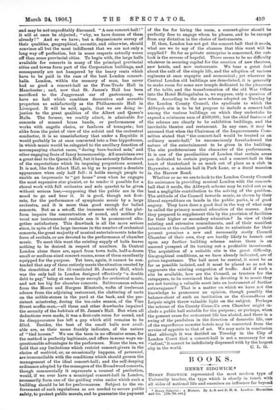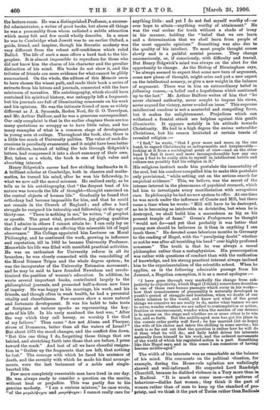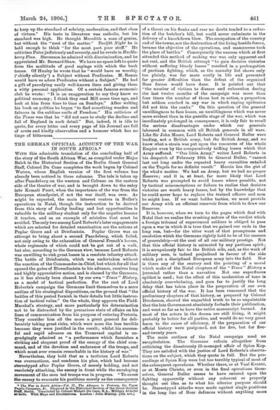BOOKS.
HENRY SIDGWICK.*
HENRY SIDGWICK represented the most modern type of University teacher, the type which is closely in touch with all sides of national life and exercises an influence far beyond
• Henry Sidgwick: a Memoir. By A. B. and E. M. S. London : Macmillan and Co. [128. 6d. net.]
the lecture-room. He was a distinguished Professor, a success- ful administrator, a writer of good books, but above all things he was a personality from whom radiated a subtle attraction which many felt and few could wholly describe. In a sense he was to Cambridge what Jowett was to an earlier Oxford, a guide, friend, and inspirer, though his Socratic modesty was very different from the robust self-confidence which ruled Balliol. The life of such a man offers a hard task to the bio- grapher. It is almost impossible to reproduce for those who did not know him the charm of his character and the peculiar distinction of his mind. His books do not show it, and the tributes of friends are mere evidence for what cannot be glibly summarised. On the whole, the editors of this Memoir seem to have chosen the wisest path, and made their book a series of extracts from his letters and journals, connected with the bare minimum of narrative. His autobiography, which should have contained his spiritual history, was unhappily left a fragment, but his journals are full of illuminating comments on his work and his opinions. He was the intimate friend of men so widely different as J. A. Symonds, Roden Noel, Sir G. 0. Trevelyan, and Mr. Arthur Balfour, and he was a generous correspondent. Our only complaint is that in the earlier chapters there are too many quotations so scrappy as to have little value, and too many examples of what is a common stage of development in young men at college. Throughout the book, also, there is a little too much of University politics. The value of such dis- cussions is peculiarly evanescent, and it might have been better if the editors, instead of telling the tale through Sidgwick's letters, had compressed it into a short summary of their own. But, taken as a whole, the book is one of high value and absorbing interest.
Henry Sidgwick's career had few striking landmarks in it. A brilliant scholar at Cambridge, both in classics and mathe- matics, he turned his mind, after he won his fellowship, to what we now call the moral sciences. He realised early, as he tells us in his autobiography, that " the deepest bent of his nature was towards the life of thought—thought exercised on the central objects of human life." Gradually he found that orthodoxy had become impossible for him, and that he could not remain in the Church of England ; and after a hard struggle he resigned his tutorship and fellowship at the age of thirty-one. "There is nothing in me," he writes, "of prophet or apostle. The great vital, productive, joy-giving qualities that I admire in others I cannot attain to : I can only lay on the altar of humanity as an offering this miserable bit of legal observance." His College appointed him Lecturer on Moral Philosophy, and he continued the work, growing in influence and reputation, till in 1883 he became University Professor. Meanwhile his life was filled with manifold practical activities. He was an enthusiast for University reform in all its branches; he was closely connected with the remodelling of the Moral Science Tripes and the whole degree system; he was the inaugurator of the University Extension movement; and he may be said to have founded Newnham and revolu- tionised the position of women's education. In addition, he wrote several important books, contributed largely to the philosophical journals, and promoted half-a-dozen new lines of inquiry. He was happy in his marriage, his work, and his friends, and though often in weak health, he had a perennial vitality and cheerfulness. Few careers show a more natural and fortunate development. It was his habit to take texts of Scripture at various epochs as representing the key- note of his life. In his early manhood the text was, "After the way which they call heresy, so worship I the God of my fathers." Then came " Are not Abana and Pharpar, rivers of Damascus, better than all the waters of Israel ? " But about 1875 the mood changes, and the conflict dies down. "But this one thing I do, forgetting those things that are behind, and stretching forth into those that are before, I press toward the mark." And last of all we have cheerful resigna- tion in " Gather up the fragments that are left, that nothing be lost." The courage with which he faced his sentence of death, and the serenity with which he made his final arrange- ments, were the last testament of a noble and single- hearted life.
Few more completely reasonable men have lived in our day. He was always ready to consider a question on the merits, without heat or prejudice. This was partly due to his. genuine modesty. "I am a curious mixture," he once wrote, "of the itryachlruxor and ptsp64,vxos : I cannot really care for anything little : and yet I do not feel myself worthy of—or ever hope to attain—anything worthy of attainment." He was the real seeker for truth without a shade of irony in his manner, holding the " belief that we can learn and a determination that we shall learn from people of
the most opposite opinions." Something was also due to the quality of his intellect. To most people thought comes slowly and is a paififul mental process. They change unconsciously, or, if consciously, with difficulty and travail. But Henry Sidgwick's mind was always on the alert for the opportunity to change. As the Bishop of Birmingham says, "he always seemed to expect that some new turn of argument, some new phase of thought, might arise and put a new aspect on the intellectual scenery, or give a new weight in the balance
of argument. There was in him an extraordinary belief in following reason,—a belief and a hopefulness which continued up to the last." Mr. Arthur Balfour writes of him that "he
never claimed authority, never sought to impose his views, never argued for victory, never evaded an issue." This supreme intellectual candour is not a masterful and compelling force, but it makes for enlightenment. Prejudices which can withstand a frontal attack are helpless against this gentle
illuminatio. It appears notably in his attitude towards Christianity. He had in a high degree the anima naturaliter Christiana, but his reason hesitated at certain tenets of revealed religion :- "I find," he wrote, "that I grow more and more, on the one hand, to regard Christianity as indispensable and irreplaceable— looking at it from a sociological point of view—and on the other hand to find it more and more incomprehensible how any one whom I feel to be really akin to myself in intellectual habits and culture can possibly find his religion in it."
His religious instinct made him postulate the immortality of
the soul, but his candour compelled him to make this postulate only provisional, "while setting out on the serious search for empirical evidence." This, we believe, was the secret of the intense interest in the phenomena of psychical research, which led him to investigate every manifestation with scrupulous care. In philosophy he had no new system to offer. At one time he was much under the influence of Comte and Mill, but there came a time when he wrote: "Mill will have to be destroyed, as he is becoming as intolerable as Aristeides, but when he is destroyed, we shall build him a mausoleum as big as his
present temple of fame." Green's Prolegomena he thought " would not do—and yet that probably it was better that young men should be believers in it than in anything I can teach them." He devoted some laborious months in Germany to the reading of Hegel, with the " paralysing doubt" whether
or not he was after all troubling his bead " over highly profound nonsense." The truth is that he was always a moral philosopher rather than a metaphysician. His preoccupation was rather with questions of conduct than with the unification of knowledge, and his strong practical interest always inclined him to the experimentalism of the scientific school. When he applies, as in the following admirable passage from his Journal, a Hegelian conception, it is as a moral apologue
"I have gone through very markedly the change from sub- jectivity to objectivity, which Hegel (I think) somewhere describes in one of those rare human passages which occur in his works— how that consciousness of personality is naturally developed in youth's period of struggle and hesitation, when we doubt of our whole relation to the world, and know not what of the great things we conceive we are really to do, under what banner we aro to serve, wonder whether we are called to contemplation or action, fruition or renouncement, wonder when the maiden of our dreams is to appear on the stage and whether we or some other is to win her, and so forth. But the middle-aged man has got his place in the cosmic order pretty well fixed ; he has married (let us hope) the wife of his choice and taken the shrill g in some service ; his work is so far cut out that the question is rather how he will do it than what he will do; and daily habit drives his interests naturally from himself to his work, and the ordered movements of the world of which his regulated action is a part. Something like this Hegel says, and in this sense I am conscious of having become middle-aged."
The width of his interests was as remarkable as the balance of his mind. His comments on the political aituation, for example, during the Home-rule agitation are unfailingly shrewd and well-informed. He suspected Lord Randolph
Churchill, because he disliked violence in a Tory more than in a RadicaL " It is much as some men—not patterns of behaviour—dislike fast women, they think it the part of women rather than of men to keep up the standard of pro• priety, and we think it the part of Tories rather than Radicals to keep up the standard of sobriety, moderation, and that class of virtues." His taste in literature was catholic, but his standard was high. He thought Meredith a man of genius, but without the "root of the matter." Twelfth Night he is bold enough to think "for the most part poor stuff." He criticises Paterjudithously and severely, and he revels in Huckle- berry Finn. Stevenson he admired with discrimination, and he appreciated Mr. Bernard Shaw. We have no space left to quote from the multitude of good sayings with which the book teems. Of Huxley he wrote that he "would have us worship (` chiefly silently') a Subject without Predicates. M. Renan would have us adore Predicates without a Subject." He had a gift of parodying easily well-known lines and giving them a witty personal application. Of a certain famous economic club he wrote : "It is an exaggeration to say they know no political economy; I think they read Mill some time ago, and look at him from time to time on Sundays." After writing his book on politics he began "to find something wooden and fatuous in the sublime smile of Freedom." His criticism of the Times was that he "did not care to study the decline and fall of England in such detail." But, indeed, it is idle to quote, for every letter and every page of his Journal are full of acute and kindly observation and a humour which has no tinge of bitterness.












































 Previous page
Previous page